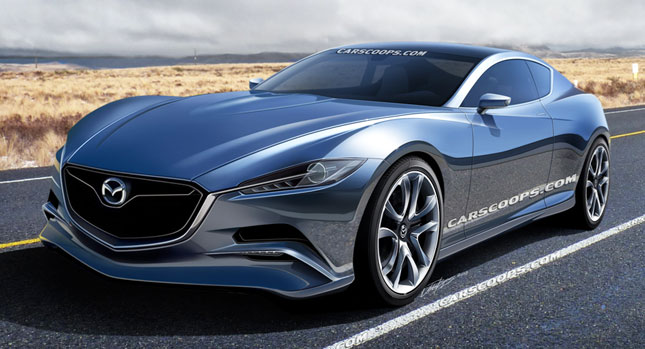When the word rotary is mentioned to any car enthusiast, you can always guarantee that their first thoughts will conjure up memories of Wankel-powered sports cars from Mazda’s past.
Since the Cosmo Sport was launched in 1967, the Mazda rotary has amassed an huge following of loyal owners and admirers. Praised for their unique design, smooth operation and trademark rotary engine note, it’s an engine configuration that stood out from the competition and formed the bases for the legendary RX series of performance vehicles.
Today, there is void in the Hiroshima-based company performance line-up; the RX-8 has ceased production, leaving no other rotary powered option on their new car menu. All is not lost, as word has it that Mazda are readying a new chapter in Wankel propulsion, although fans will be in for a small wait due to it being earmarked as an 2017MY release.
While no test mules have been snapped to date wearing the next generation attire, one’s collective mind does ponder about what shape the upcoming Japanese uber-coupe will take. With that in mind, I thought it would be a great opportunity to draft up a conceptual proposal to gauge feedback as to which direction Mazda should head stylistically.
First things first; yes, this illustrated proposal has been heavily influenced by the fantastic-looking Mazda Shinari concept car that previewed the look of the current Mazda6. Familiar lines carry over from that car, further embracing the corporate Kodo (“soul of Motion”) design language. Obvious changes start with the rear doors making way for the more ‘pronounced’ rear haunches and upswept rear quarter windows. These alterations give it a wider stance, further emphasizing its sporting aspirations using visual clout.
As your eyes move towards the business-end, one will see the lower bumper now incorporates air intakes on either side – primarily for cooling purposes, they also add an aesthetic aggressiveness too. Flanking the outer edges of the dominant, wildlife-eating front grill are broader headlamps that incorporate LED’s on the lower edges. Further up, a subtly raised hood encompasses a recessed power-dome, while the prominent fender flares stay true to the classic sports car blueprint.
While not shown here, the rear-end follows a more aggressive interpretation of the latest Mazda3‘s hind quarters. Initial train of thought was to take inspiration from RX’s of old with their ‘upright’ rear window glass cutaways, however, in the interests of in-keeping with the Kodo design language, it was decided that a more conventional approach was taken. Beneath the sculptured cloak, the interior largely follows the tense, athletic exterior with a driver-centric layout and high quality materials.
Powering this ‘soul of motion‘ rolling artwork is Mazda’s next generation rotary engine, internally named 16X. This new mill is expected to be much more fuel efficient than the last Renesis engine; incorporating SKYACTIV technologies like direct injection and a high compression ratio for better thermal efficiency. This new unit is also expected to gain 300cc of displacement over the RX-8′s, taking it to 1.6L in capacity. Horsepower figures should be at least 300, with those numbers being channeled through a new 6-speed manual and why not, an optional dual clutch transmission to the rear wheels.
The SKYACTIV philosophy will also contribute to weight savings by utilizing the next-generation Miata/MX5 platform. This combined with extensive use of aluminum should keep the pounds restricted to Subaru BRZ/Toyota/Scion 86 levels, aiding performance and handling to boot.
Speaking of rival competitors, it will join an increasingly crowded segment against the Subaru/Toyota twins, Nissan 370Z, Hyundai Genesis coupe, Ford Mustang and more premium coupe offerings from Audi, BMW and Lexus. All of these shouldn’t trouble Mazda too much as early indications have a recipe brewing for success, although its unconfirmed 2-person seating configuration may limit appeal.
This proposal is just one direction Mazda could head, and I’m sure there are many other design alternatives out there that are equally as good or better. So what path do you think Mazda should head down and should it be called the RX7, RX8 or RX9? Let us know in the comments below.
By Josh Byrnes
Photo Renderings Copyright: Carscoops / Josh Byrnes
*Rotary-powered Mazda coupes featured in gallery:
1967-1972 Cosmo Sport 110
1978-1985 RX-7 Mk1
1986-1991 RX-7 Mk2
1990-1995 Eunos Cosmo
1992-2002 RX-7 Mk3
2003-2012 RX-8
PHOTO GALLERY






















